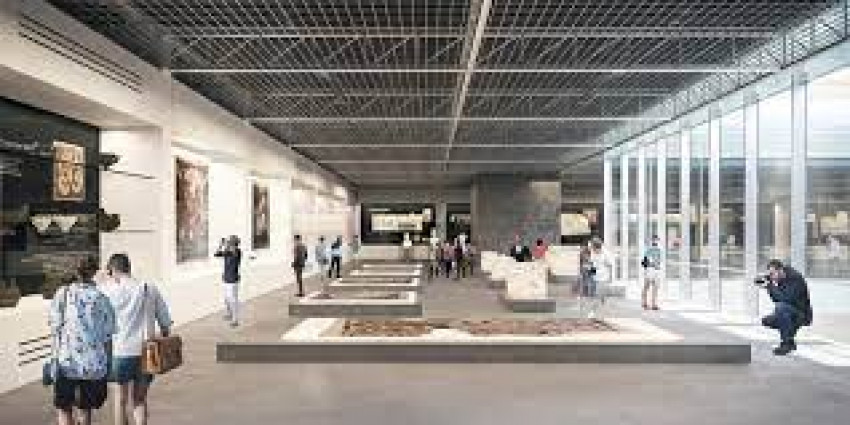
Archeological Museum
Duration
1 to 1 Days
1 to 1 Days
Best time to visit
Theme
Heritage
Heritage
Archeological Museum Travel Guide
Archeological Museum is a destination steeped in history and culture, known for its ancient artifacts and archaeological sites. Located in a region rich in heritage, this museum offers visitors a glimpse into the past through its extensive collection of relics and exhibits. The city itself is a blend of modernity and tradition, making it a captivating place to explore.Top Attractions in Archeological Museum
- The Acropolis
- Ancient Agora
- National Archaeological Museum
- Parthenon
- Plaka District
Archeological Museum is Famous for
Ancient artifacts and archaeological sites.Top Attractions in Archeological Museum
- Exploring the Acropolis
- Discovering the history at the National Archaeological Museum
- Strolling through the charming Plaka District
- Marveling at the iconic Parthenon
- Shopping and dining in the bustling Monastiraki Square
What's Great about Travelling to Archeological Museum?
- History enthusiasts
- Culture seekers
- Architecture lovers
What's Not So Great about Travelling to Archeological Museum?
- Those looking for a beach destination
- Travelers seeking a vibrant nightlife scene
- Visitors with limited interest in history and culture
Travel Tips for Archeological Museum
- Check visa requirements before traveling
- Use public transportation to get around the city
- Be cautious of pickpockets in crowded areas
Important Archeological Museum trip information
- Ideal Duration: 3-4 days
- Best Time to Visit: Spring or Fall
- Nearby Airports and Railway Stations: Athens International Airport, Athens Railway Station
FAQ's on Archeological Museum
Q1: What is the best time to visit Archeological Museum?
The best time to visit the Archeological Museum is during the spring and fall seasons when the weather is mild and perfect for exploring outdoor attractions. These seasons also offer fewer crowds compared to the peak summer months. Additionally, consider visiting during special events or festivals to immerse yourself in the local culture and heritage.
Q2: Do I need a visa to travel to Archeological Museum?
Tourists visiting the Archeological Museum may need to check the visa requirements based on their nationality. Some countries have visa-free entry or visa-on-arrival options, while others may need to apply for a visa in advance. It is essential to research and comply with the visa regulations before planning your trip.
Q3: What are the must-visit attractions in Archeological Museum?
The Archeological Museum boasts a rich history and a myriad of attractions to explore. Must-visit sites include ancient ruins, historical landmarks, and culturally significant museums. Don't miss the iconic archaeological sites, vibrant marketplaces, and picturesque landscapes that showcase the country's diverse heritage.
Q4: Is Archeological Museum a safe place to travel?
Archeological Museum is generally a safe destination for travelers. However, like any other place, it is advisable to stay cautious, especially in crowded areas and at night. Avoid isolated areas and take necessary precautions to safeguard your belongings. It's recommended to stay informed about the local customs and follow basic safety guidelines during your visit.
Q5: What is the local currency in Archeological Museum and can I use credit cards?
The local currency in the Archeological Museum is important for travelers to familiarize themselves with. While credit cards are widely accepted in urban areas and tourist spots, it's advisable to carry some cash for smaller purchases and transactions. ATMs are also available in major cities for convenient access to local currency.
Q6: What is the local cuisine like in Archeological Museum?
The local cuisine in the Archeological Museum is a delightful mix of flavors and traditional dishes. From savory street food to exquisite fine dining options, visitors can savor a variety of dishes that reflect the country's culinary heritage. Be sure to try the and explore the bustling food markets for an authentic gastronomic experience.
Q7: What transportation options are available in Archeological Museum?
Travelers in the Archeological Museum can choose from various transportation options to explore the country. Public transport such as buses and trains offer convenient connectivity between cities, while taxis and ride-sharing services provide flexible travel within urban areas. Car rentals are also available for those who prefer self-driving and exploring at their own pace.
Q8: Are there any cultural norms or etiquette I should be aware of when visiting Archeological Museum?
Understanding the local customs and etiquette is essential when visiting the Archeological Museum. Respect for elders, modest dressing, and greetings with a polite gesture are common practices. It's also important to be mindful of religious sites, traditions, and social norms to show cultural sensitivity. Engaging with locals and embracing the cultural heritage will enhance your travel experience in the Archeological Museum.
Q9: I am a travel agent. How can I buy travel leads of Archeological Museum?
Register yourself as a travel agent at agents.tripclap.com and then you can buy travel leads to Archeological Museum once your account is approved. For more details contact our support team at +91-8069186564 or support@tripclap.com
